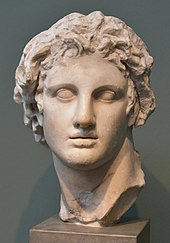
When you hear claims of deity, debatable locations of tombs or bodies and the title “King of Kings,” you usually think of Jesus. Certainly, if you come from an evangelical persuasion. But before Jesus there was another king of kings, one who claimed to be the child of God. One who claimed he had all authority on the face of the planet. One who was faithful in his offerings and sacrifices. Before Jesus, there was Alexander.

Alexander has been a focus of the historian’s fancy for quite some time. Of course, there are those that think his tomb has been found, but there are others who think it is still a mystery where his body lay. One thing that isn’t a mystery though, is Alexander’s imprint left on our civilization. This man had conquered the known world by his mid-twenties. (Meanwhile in my mid-twenties I was microwaving Hot Pockets and attempting to finish Stranger Things before I had to go back to work on Monday). It’s what has made Alexander such a pivotal figure in the history books. But more than his conquering nature, Alexander was extremely religious.
Alexander would see an eagle fly over his marching army, and it would be a symbol of a battle soon to be won. Or perhaps he’d see ravens soaring high above, and it was a negative omen, one he would heed. Sometimes Alexander was even known to go off course to travel to a local oracle and hear what the gods had in store for him. The one question he was always wanting to ask: “Am I the son of Zeus?”
Not only was Alexander religious, but he thought he was truly the seed of deity. It’s hard to blame him for such thoughts, considering his successes, at least militarily. But in the end, the law came for him like it does for the rest of us. He couldn’t conquer enough. Even when his troops were longing for the homeland and exhausted from their far-reaching travels, he continued to press on. To go farther for his people than any other king ever had. And in the end, he died like the rest of us.
I’ve heard apologists plenty of times ask the seemingly rhetorical question: If Jesus is dead, where is his body? This question is supposed to quickly convert and transform someone’s life — which it often doesn’t accomplish. Perhaps because the same could be said for numerous people. Where is the body of Genghis Khan? Mozart? Vlad the Impaler? Sure, we aren’t as interested in the happenstance of these corpses but the point still stands. A missing body is one thing, but an empty tomb with a compelling story sure makes the difference.

In the case of Alexander, we have a man who sought out to prove he was deity. Through battles waged and villages burned down, Alexander was going to prove to the world he was truly great. Some say he had a serious passion for the Macedonian people, but when it came down to brass tacks, Alexander was a man on a mission. The omens, signs, and oracles he saw revolved around him and his desires. In this sense, religion was a ladder for him. He climbed his way up. The more he conquered, the higher he ascended.
In the case of Jesus, we still have a ladder, but opposite of Alexander, Jesus descends it. We have Jesus, the God-man, who didn’t seek out his own identity as God’s son but was declared it by God himself. Jesus, who was offered the entire world and denied it. Jesus, who at some points, as in the Garden of Gethsemane, seemed to be struggling with the task at hand. Jesus, who conquered not by killing but by giving his own life. And what we see is not just a missing body that history leaves a mystery but rather a greater story. A greater kingdom, a greater deity.
Alexander may not have been dressed in camel’s hair with a leather belt around his waist eating locusts and wild honey. And he certainly was not preaching in the wilderness of Judea. But valiantly riding his horse Bucephalus, armored in the finest ancient gear, he unknowingly served as a type of John the Baptist.
Alexander paved the way for a king he did not know. Seeking glory for himself, and perhaps his people, in the end he furthered a different kingdom than his own. One that would last and surpass the very one he spent his life building. For the straight, flat roads Alexander and his ferocious army built for killing and destroying their enemies were ultimately travelled by the early church and used to bring new life to foreign lands. The Greek language spread by the conquering warriors was used to help peddle the gospel around the world in a quick manner. Alexander’s feats are nothing short of astounding and should be remembered without a doubt. A man with such passion and accomplishments at a young age is quite the case to study. But where’s the good news from such a king? Where’s the hope for us today?
Thankfully, we have a conqueror who has defeated humanity’s universal foe: not surrounding tribes, but sin itself. One who deemed himself “not great” so that we could be seen as “great” in the eyes of the Almighty. One who established a kingdom that will not perish in the rubble of history but that will endure for eternity. One whose body may be missing from the historical record but stands firmly in our place before the Father.

COMMENTS
Leave a Reply












